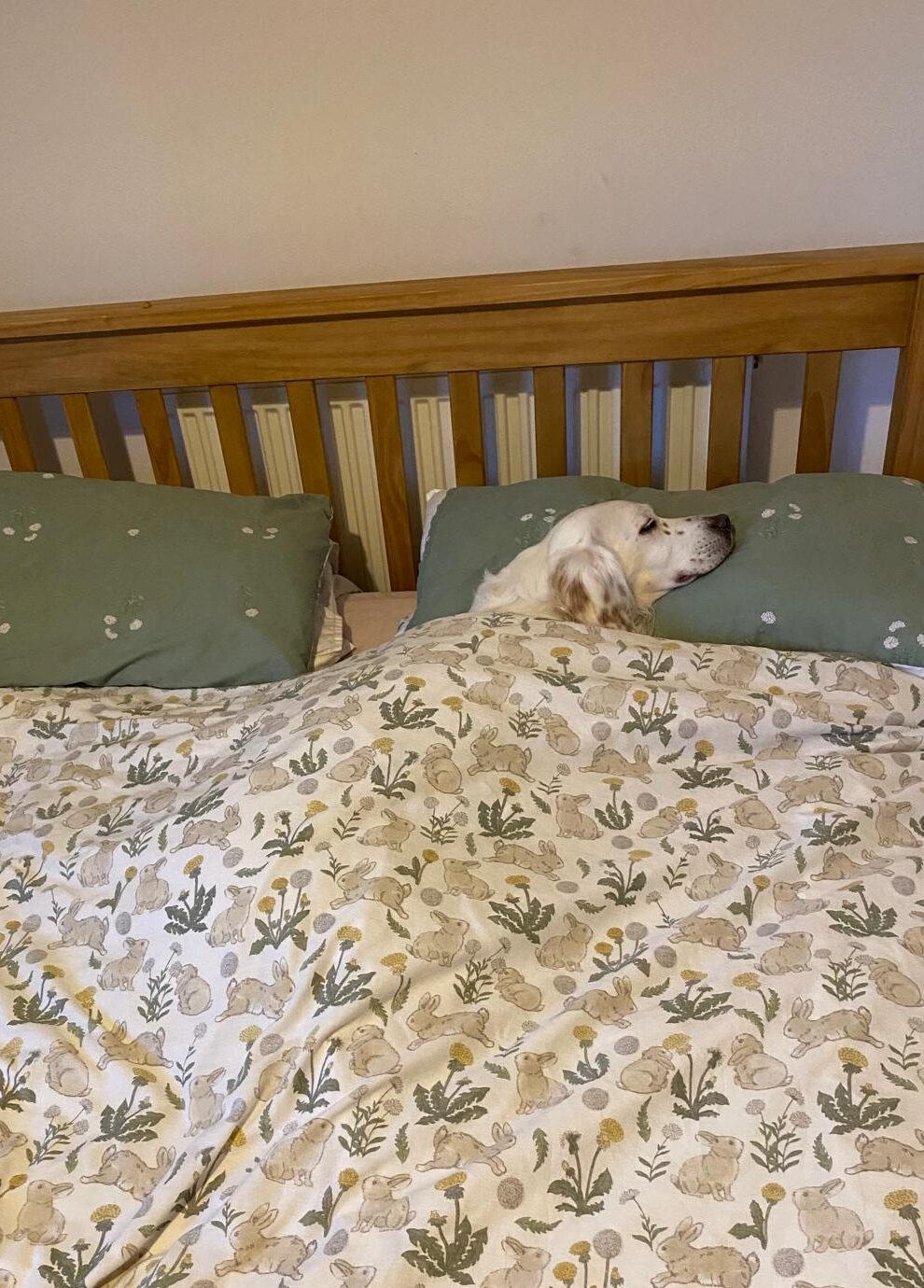Dogs are never too old to learn new things, and toilet training is no exception.
Regardless of whether you adopt a puppy, adult or a senior dog, the same principles apply for toilet training.
The key is to teach your dog good toilet habits. If you don’t teach them, then they can’t be expected to know where they should be going on their own.
Some dogs will take longer to toilet train than others and it’s not unusual to have setbacks along the way. Most of our rescue dogs will have never lived in a home environment before they arrive to their forever family or foster family, so they will need to be toilet trained.
It’s also important to keep in mind that even dogs who are toilet trained and have previously lived in a home environment can have setbacks with their toilet training. Stressful life changes such as a dog moving to live with a new family, moving house, a new dog/baby’s arrival and even separation anxiety, can all cause some dogs to have setbacks with their toilet habits.
This guide seeks to give you useful advice to help you, help your dog, create good toilet habits.
Create good habits
Toilet training should be a positive experience for your dog. You need to help them ensure that when they’ve got to go, they’re in the right place for that.
The best way to help create these habits is by creating a schedule of toilet breaks. This means taking your dog/puppy to the garden to give them the opportunity to go to the toilet. Stay with them, but don’t actively distract them once outside. Allow them to explore and do their business. Once they’ve gone, give them some quiet praise.
Your ‘schedule’ of toilet breaks should be based around daily events where your dog’s bladder is likely to be full. Typically, this should include garden visits:
- When they wake up
- After eating
- After drinking
- When you come back home
- Before, during and after a period of activity – e.g. playtime, a walk, car journey, visitor to the home
- Before bedtime
You should also seek to include intermittent toilet breaks throughout the day if your dog is awake. If you have a puppy, these breaks should be more frequent for periods where they’re not asleep, such as every twenty to thirty minutes if they’re awake for that duration.
Puppies
Puppies need more frequent toilet training trips because they have far smaller bladders and far less bladder control than adult dogs, so naturally they’ll need to go to the toilet far more often. Most adult dogs will be able to sleep through the night without needing to empty their bladders, but young puppies will need to go to the toilet perhaps once or twice through the night.
If you have a young puppy, be prepared to carry your pup to the garden if they wake up during the night and give them the opportunity to go to the toilet.
Accidents
We all know accidents happen. If your dog has an accident in the house, it’s not their fault!
Most newly arrived dogs will have accidents in the home when they’re settling in. It happens because they’re not yet toilet trained, and you didn’t take them outside when they needed to go. It’s as simple as that.
Please don’t get frustrated. Keep positive and persist with the basics. Every dog will take a different amount of time to toilet train. Your dog deserves your patient and support while they learn.
Of course, you may have a dog that has been fully house trained who suddenly starts having accidents in the house again. If these accidents aren’t a one off, and are becoming more regular, then there are a few things to consider.
Take notes of when your dog goes to the toilet, include walks and feeding and you will notice patterns emerge. Go back to the basics and take them out into the garden to give them the opportunity to go, with praise when they do. Remember, you need to train yourself to know when your dog will need to go.
If you notice your dog only ever has an accident when they’re home alone, this could be for a number of reasons, such as:
- you didn’t give them the opportunity to go to the toilet before they were left
- they’ve been left alone too long
- they may have separation anxiety and be so stressed being home alone that it’s causing them to have accidents. If this is the case, you will need to deal with the root cause of this which is your dogs separation anxiety.
Important – sudden changes in your dog’s toilet habits should be noted! They can sometimes be caused by a medical issue, for example very frequent urination (more so than they would normally), can indicate a possible UTI. If in doubt, contact your vet to discuss any concerns.
Telling dogs off for accidents
Like all dog training, it is so important to keep toilet training positive!
If and when your dog has an accident in the house, telling your dog ‘No!’ or telling them off for this is NOT helpful.
You are NOT training or helping your dog by doing this.
Shouting ‘No!’ won’t stop the behaviour and the only outcome will be that it negatively impacts on your dog’s relationship with you, which no one wants.
Telling your dog off makes you appear scary to them and breaks their trust in you. It won’t stop or ‘correct’ them from toileting in the house – it will just stop them going to the toilet in front of you.
Things to avoid
- Restricting access to water – this will not help to create good toilet habits! Your dog must have access to clean, fresh drinking water at all times. Removing this access can impact negatively on your dog’s health and can also cause some dogs to binge drink water once it is made available to them and actually increase the chance of them having a toilet accident
- Telling a dog off for accidents in the house
- Using newspapers or puppy training pads – the clean up is easier but their use can cause confusion for dogs as they’re taught to toilet inside the house, and they then need to relearn the transitions to going to the toilet outside
- Leaving the door open – this isn’t teaching a dog to go outside to the toilet
- Treats for when a dog toilets in the garden – it’s so important to keep toilet training a positive experience for your dog BUT giving a treat is rewarding your dog for what they did but not where they did it. This means a clever dog may manipulate this to their advantage and do lots of smaller wees for a reward and not actually fully empty their bladder. Verbal praise to your dog when toilet training is enough for their positive reinforcement
- Relying on your dog telling you that they need to go – when you’re training your dog, you can’t expect them to always indicate to you that they need to go to the toilet. They are still learning. Have your schedule in mind for when they’ll need to empty their bladder and take them out accordingly. Of course, as they learn good toilet training habits most dogs will indicate that they need to go to the toilet, but remember this also requires you to notice that is what they’re doing. Some dogs indicate in more obvious ways than others, it’s up to you to learn what your dog is trying to communicate to you.
For more information, see Sally Bradbury’s blog –Toilet Training.





